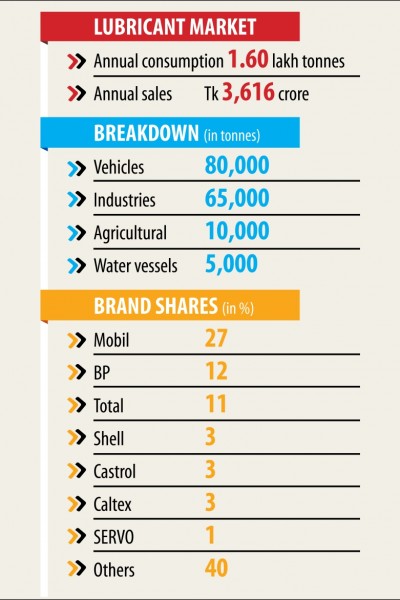Lubricant consumption rises but prices stay high

The market for various petroleum products has expanded at an average rate of about 6 per cent in the last eight years following a rise in the number of vehicles and power plants in service.
But, the end users are yet to enjoy the benefits that usually accompany a competitive market, such as product diversity and lower costs, due to a lack of local production.
“The industrial sector will be benefitted when engine oils are blended in the country as only then will prices come down. Lube processing is not a high tech industry,” said Amirul Haque, managing director of Premier Cement.
Petroleum products are materials derived from crude oil and processed at oil refineries to make motor oil, engine oil, engine lubricants and a host of other products.
Consumers of petroleum products in the industrial sector use imported engine oils or locally blended ones as there are no available alternatives.
Only when the products are processed in Bangladesh can consumers compare prices and enjoy benefits, said Tapan Sengupta, deputy managing director of BSRM.
If the multinational companies form joint ventures with local companies to blend petroleum products in Bangladesh, then the bulk users would be greatly benefited, he added.
About 20 per cent tax is imposed on the import of finished lubricants, while the tax for base oil import is only 10 per cent.
“So this system is not encouraging for companies who want to blend the lubricant locally,” said Md Shahin Alom, deputy general manager for sales and marketing at MJL Bangladesh, which blends competitive grade lubricant named ‘Omera’ brand alongside Mobil.
In 2019, the market size for petroleum products reached Tk 3,616 crore, with total demand standing at 1.60 lakh tonnes.
The demand for the products will continue to rise in line with the increasing population as it is an essential part of maintaining or operating any kind of machinery, according to market insiders.
In anticipation of the growing engine oil market, Pertamina Lubricant, an Indonesian state-owned oil and gas company, launched their Bangladesh operations last week.
Consumers can benefit from market saturation as it leads to lower costs and better quality, said Zeeshan Saif, chief marketing officer of Pertamina, whose products are being marketed through their local partner Intraco CNG.
The demand for lubricants will continue to rise for the next 15 years at least, with rental power plants and the industrial sector together accounting for about 40 per cent of total consumption, said Alom of MJL Bangladesh.
With the number of power plants operating in the country having jumped to 133 in the last nine years, electricity production has increased nearly four and a half times, according to data from the Bangladesh Power Development Board.
The Bangladesh oil market is consolidated by the top five players -- MJL Bangladesh (Mobil), Navana Petroleum (Caltex/Chevron), Trade Services International (Total), Rahimafrooz (BP) and Ranks Petroleum (Royal Dutch Shell PLC).
They account for about 50 per cent of the total market share while the remaining half is split up between other brands, according to industry insiders.
Mobil leads the charts with 27 per cent market share; it is followed by British Petroleum (BP), whose market share is 12 per cent. French multinational Total control 11 per cent of the market, while Shell, Castrol and Caltex enjoy 3 per cent each. SERVO sits at the bottom with one per cent of the total market share, industry insiders said.
Despite the growing market for engine oils, consumers are yet to experience any benefits seeing as the Original Equipment Manufacturers (OEM) say that the oils used in their machinery must meet certain requirements -- and the local producers are unable to meet them.
Consumers should follow OEM guidelines if they want their engines to last, said Ruhul Huq, director of Trade Service International and distributor of TOTAL.
However, consumers will ultimately be benefited by increased competition in the market, he added.
